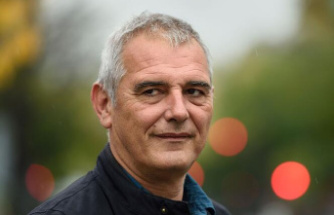Dear Ms Peirano,
we are two sisters (Nina, 36, and Mara, 32). We have a very close relationship, but it's probably just too close. Our mother was depressed since we were children. Often she couldn't get out of bed or she only managed the bare essentials.
Nina: I felt sorry for Mara. I have been taking care of Mara, cooking, picking her up from school and comforting her for as long as I can remember. She came to play with me and I took care of her because our mother was in bed.
When our father separated and moved in with another woman, I (Nina) then looked for a job, although I would have liked to study. But I wouldn't have had the heart to let Mara down.
Mara: Nina had twins eight years ago, and I stepped in and helped her. I was actually like a second mother, which often overwhelmed me during my studies. Then Nina's boyfriend got sick and I took a year off from my studies to help with the twins and support Nina.
We've always had a very close bond and know what the other needs.
Mara: I've had depression for two years, and I'm slowly realizing that it has to do with being overworked in recent years. Many other things happened: there was a fire in my apartment, our grandmother was in need of care and died, Nina went into debt...
Nina: I helped Mara a lot when she was depressed. I tried to cheer her up and go to sports with her, she lived with me for weeks.
Now we both stand there realizing that it's probably not good for us if we always put so much focus on each other first, because we've both just been through too much bad stuff and we both need to get back on our own. But somehow we feel each other's need and try to protect each other as much as we can.
Now how can we get out of this pattern?
Many greetings
Mara and Nina Z.
Dear Nina Z., dear Mara Z.,
Do you know the saying "Where there is much light, there is also much shadow"? It sounds like the two of you were very close from an early age because your parents didn't seem to fulfill the parenting role adequately. You, Mara, stepped in as an elder, trying to save your little sister from the gaps and deficits that come with parents (or here a depressed parent) not taking the child to school or providing food, comfort and be able to provide clear structures.
An image always comes to mind to describe families where one parent is absent. Imagine a family goes hiking. The father carries the heaviest rucksack, his things and maybe also the tent and the cookware because he is the strongest. The mother carries what she needs, plus food and clothing for everyone. The big kid can already wear almost all of their own clothes, and the little kid carries an apple, the water bottle and his teddy bear. But what happens when the father fails? Then the burden is redistributed, and the mother and children are loaded more heavily. The tour will be much more strenuous for everyone, and playing in an uninhibited way is not always an option. And of course you have to think carefully about what you can take with you at all, so that one or the other is missing.
With you two, I have in mind two delicate girls who had to carry backpacks that were far too heavy. And you, Nina, as the older one, tried to take as much from Mara as possible and suffered damage yourself as a result. When Mara grew up herself, she tried to take revenge and relieve you as a big sister. But no matter how the load was distributed: it wasn't enough at the back and at the front.
I work as a behavioral therapist and love coach in private practice in Hamburg-Blankenese and St. Pauli. In my PhD, I researched the relationship between relationship personality and happiness in love, and then wrote two books about love.
Information about my therapeutic work can be found at www.julia-peirano.info.
Do you have questions, problems or lovesickness? Please write to me (maximum one A4 page). I would like to point out that inquiries and answers can be published anonymously on stern.de.
Then came the twins (!) and many strokes of fate that required additional strength and commitment and made the luggage even heavier.
And you both tried the tried-and-true methods: helping each other, stepping in, sharing — while pushing your own breaking points. Because there was probably no opportunity in your childhood to learn something about stress limits when you have to take on too much responsibility from an early age...
Incidentally, I always work with two stress limits in therapy.
One is the comfort level. For example: I go to the supermarket for another half hour to do the weekly shopping instead of resting. I can still do this without pain, but my relaxation and lightness is sacrificed.
The other limit is the pain limit: I drag myself to work with a fever, I don't go on vacation for years or I have two jobs at the same time despite insomnia. This is where it gets really damaging, physically and mentally, in the long run.
My recommendation is to perceive and adhere to the comfort level in order not to go into an energy deficit. Because you also need energy to recharge the batteries. When you're really exhausted, you don't have the strength or time to exercise, practice yoga, meet friends, or pursue your interests.
You're both wondering (and me) how to get out of this cycle. First of all, I think it's great that you've both become aware of the problematic patterns AND that you both want to do something about it (and that you're even writing to me together!). It could also be that one of you would be against a change - and then there would be tensions between you.
I advise you to develop a healthy selfishness. True to the motto from the plane: put on an oxygen mask first before helping others. You could both take a stress management course (MBSR, stands for mindfulness based stress reduction). You learn meditation, body awareness exercises, gratitude, a plunge into yourself. You can then talk about it together on this level if one of you is feeling stressed. And you could also meditate together or attend to your needs (e.g. doing yoga) when one of you is tense. My husband and I did an MBSR course together and it is extremely enriching and helpful for our life together.
The second would be if you both think aloud more often, whenever you perceive expectations of your sister (or the twins, or those around you) and react to them almost automatically. You might say: Mara, I sense that you are exhausted and I catch myself wanting to do the grocery shopping or the twins for you. But I also realize that I need sleep and time for my sports myself and I'm not offering that to you now. The result is the same (I'm not helping my sister), but by thinking out loud, the other sister is brought on board and can better understand the decision.
The third would be if you both practice something in which each may/can/must only think of themselves. For example, hold competitions against each other and really aim to win. I am thinking, for example, of table tennis, board games, running races. This playfully trains healthy egoism. Or take the last piece of cake without asking and practice that the other person has to protest if she wants something too. Only those who can say no can really say yes.
Really think the help you offer through to the end. How do I feel if I now give up my break/weekend/quiet evening and help out?
Changing the patterns will likely go a long way, and seeking family therapy to help you along the way can help. It is best to go to a therapist who also offers one-on-one sessions, so that you can both take particularly stressful topics out of your backpack and "get rid of them" there without the nurse being involved. I wish you that you will soon be able to go through life with lighter luggage and therefore more carefree togetherness!
Best regards
Julia Peirano












